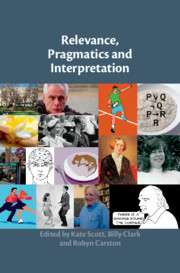Book contents
- Relevance, Pragmatics and Interpretation
- Relevance, Pragmatics and InterpretationEssays in Honour of Deirdre Wilson
- Copyright page
- Contents
- Contributors
- Cover Acknowledgements
- Introduction
- Reflections on the Development of Relevance Theory
- Part I Relevance Theory and Cognitive Communicative Issues
- Part II Pragmatics and Linguistic Issues
- Part III Figurative Language and Layered Interpretations
- 15 Metaphor and Metonymy in Acquisition
- 16 Relevance and Metaphor Understanding in a Second Language
- 17 Component Processes of Irony Comprehension in Children
- 18 Allegory in Relation to Metaphor and Irony
- 19 Slave of the Passions
- 20 Adaptations as Communicative Acts
- References
- Author Index
- Subject Index
18 - Allegory in Relation to Metaphor and Irony
from Part III - Figurative Language and Layered Interpretations
Published online by Cambridge University Press: 08 July 2019
- Relevance, Pragmatics and Interpretation
- Relevance, Pragmatics and InterpretationEssays in Honour of Deirdre Wilson
- Copyright page
- Contents
- Contributors
- Cover Acknowledgements
- Introduction
- Reflections on the Development of Relevance Theory
- Part I Relevance Theory and Cognitive Communicative Issues
- Part II Pragmatics and Linguistic Issues
- Part III Figurative Language and Layered Interpretations
- 15 Metaphor and Metonymy in Acquisition
- 16 Relevance and Metaphor Understanding in a Second Language
- 17 Component Processes of Irony Comprehension in Children
- 18 Allegory in Relation to Metaphor and Irony
- 19 Slave of the Passions
- 20 Adaptations as Communicative Acts
- References
- Author Index
- Subject Index
Summary
Christoph Unger focuses on allegory, a kind of non-literal language use that has been little studied in pragmatics. He first outlines the pragmatic mechanisms employed in the processing of metaphor and irony, and then compares them with those that seem to be required for the understanding of allegories. Building on some early ideas of Dan Sperber and Deirdre Wilson, he argues that allegories are like fictions more generally in that they require the capacity to process multi-layered intentions. As such, processing allegory differs radically from metaphor comprehension (which involves ad hoc concept construction) but uses some of the same abilities as irony comprehension, specifically the ability to process utterances on two levels in parallel and the capacity to process interpretive resemblances between representations.
- Type
- Chapter
- Information
- Relevance, Pragmatics and Interpretation , pp. 240 - 252Publisher: Cambridge University PressPrint publication year: 2019
- 4
- Cited by

